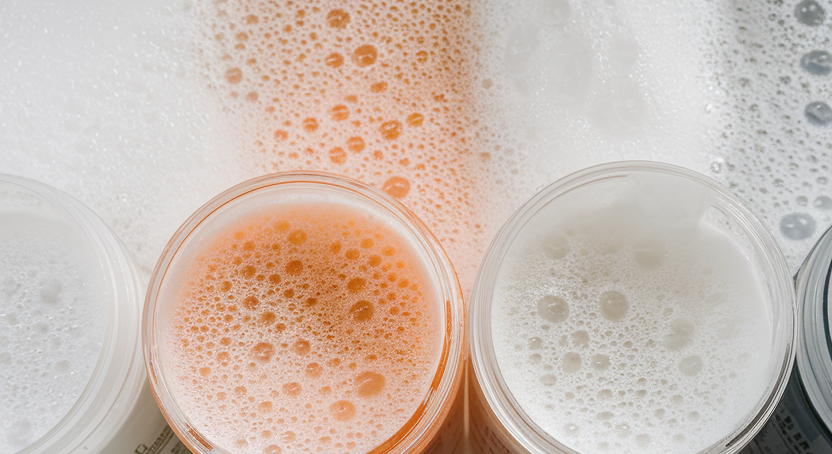Natural Cleanser Ingredients: Comparing Lauryl Glucoside, Amino Acid-Based Surfactants, Sodium Coco-Sulfate, Soap, and Glycolipids
By:
Kevin Chong
On
31/10/2024Reading time:
5 min
Summary:
Choosing the right cleanser can make a big difference, especially if you have sensitive or eczema-prone skin. In the world of natural cleansers, ingredients like lauryl glucoside, amino acid-based surfactants, sodium coco-sulfate, soap, and glycolipids all offer unique cleansing properties. But they differ in cost, foaming ability, gentleness, and suitability for sensitive skin.
In this post, we’ll explore each of these ingredients to help you make an informed choice.

1. Lauryl Glucoside
Lauryl glucoside is a non-ionic surfactant derived from sugar and coconut oil, making it a popular choice in natural skincare for its mild, eco-friendly profile.
Cost: Lauryl glucoside is relatively affordable compared to some specialty surfactants, making it a common choice for natural, budget-friendly cleansers.
Foaming: It produces a mild foam, which feels gentle on the skin and doesn’t create the thick, rich lather found in sulfate-based cleansers.
Harshness/Gentleness: Lauryl glucoside is known for its mildness and is considered non-irritating, making it suitable for sensitive skin.
Suitability for Sensitive/Eczema Skin: Its gentle nature and low likelihood of causing irritation make lauryl glucoside an ideal option for sensitive and eczema-prone skin.
2. Amino Acid-Based Surfactants (e.g., Sodium Cocoyl Glutamate)
Amino acid-based surfactants, such as sodium cocoyl glutamate, sodium lauryl sarcosinate, potassium cocoyl glycinate; are derived from coconut oil and amino acids, offering a mild, skin-friendly alternative for those looking for gentle, natural cleansers.
Cost: These surfactants are moderately priced and may cost slightly more than simpler surfactants like lauryl glucoside due to their complex formulation process.
Foaming: They provide a soft, creamy lather that cleanses without stripping moisture, though the foam is generally lighter than sulfates.
Harshness/Gentleness: Gentle and non-stripping, amino acid-based surfactants are known for their compatibility with the skin’s natural pH.
Suitability for Sensitive/Eczema Skin: Good for sensitive skin, as they cleanse effectively without disrupting the skin barrier. They’re suitable for individuals with eczema who need a delicate approach to cleansing.
3. Sodium Coco-Sulfate
Sodium coco-sulfate is a naturally derived, sulfate-based surfactant from coconut oil that’s similar to sodium lauryl sulfate but milder.
Cost: Sodium coco-sulfate is affordable and widely available, making it a cost-effective option for natural skincare brands.
Foaming: It creates a rich, bubbly lather that mimics traditional foaming cleansers, which some consumers prefer for a “squeaky clean” feel.
Harshness/Gentleness: While milder than traditional sulfates, sodium coco-sulfate can still be drying for some skin types, particularly those with sensitive or dry skin.
Suitability for Sensitive/Eczema Skin: Due to its potential drying effect, sodium coco-sulfate is less suitable for sensitive and eczema-prone skin and may aggravate these conditions if used frequently.
4. Soap
Natural soaps are typically made from saponified oils like olive, coconut, or palm oil combined with a strong base, such as sodium hydroxide (lye). You might also observe ingredients such as sodium palm kernelate, sodium palmate, sodium cocoate, or lauric acid, myristic acid and palmitic acid that comes along with sodium hydroxide or potassium hydroxide. Although natural, soap can be too harsh for sensitive skin due to its high pH.
Cost: Natural soap is generally affordable, though artisan or small-batch options can vary widely in price.
Foaming: Soap creates a high, bubbly foam, which many people enjoy. However, this high foam is due to a naturally high pH.
Harshness/Gentleness: Soap is alkaline, with a pH of around 9-10, which disrupts the skin’s natural acidic barrier. This can lead to dryness, flakiness, and irritation, especially in sensitive skin.
Suitability for Sensitive/Eczema Skin: Soap is generally unsuitable for sensitive or eczema-prone skin, as its high pH and drying nature can disrupt the skin barrier and lead to irritation.
5. Glycolipids
Glycolipids are biosurfactants derived from natural sugars, which are biodegradable and eco-friendly. They are known for being ultra-gentle, making them a great choice for those prioritizing mildness and sustainability.
Cost: Glycolipids tend to be more expensive than other surfactants due to the complex fermentation process required for their production.
Foaming: They produce a low, creamy lather (almost no foam) rather than a rich foam, which feels soft and gentle on the skin.
Harshness/Gentleness: Glycolipids are extremely gentle and skin-friendly, maintaining the skin’s natural barrier and pH balance.
Suitability for Sensitive/Eczema Skin: Due to their mild nature and low likelihood of irritation, glycolipids are highly suitable for sensitive and eczema-prone skin and are an excellent choice for those who need a very gentle cleanser.
For those with sensitive or eczema-prone skin, choosing a gentle, natural cleanser is key to avoiding irritation. While each of these ingredients has its strengths, here are some final recommendations based on skin needs:
Sensitive or Eczema-Prone Skin: Ingredients like lauryl glucoside, amino acid-based surfactants, and glycolipids offer gentle cleansing without disrupting the skin barrier. These ingredients maintain skin hydration and are the best choices for individuals with sensitive or reactive skin.
Oily or Combination Skin: If you prefer a rich, foaming cleanser and don’t have issues with dryness, sodium coco-sulfate can offer a satisfying cleanse. However, moderation is key, as it may be drying if overused.
Dry Skin: Glycolipids are ideal for dry skin, as they provide mild cleansing without stripping natural oils.
Ultimately, understanding the properties of these natural ingredients can help you select the most compatible cleanser for your skin type, ensuring your skincare routine supports a healthy, balanced complexion.
